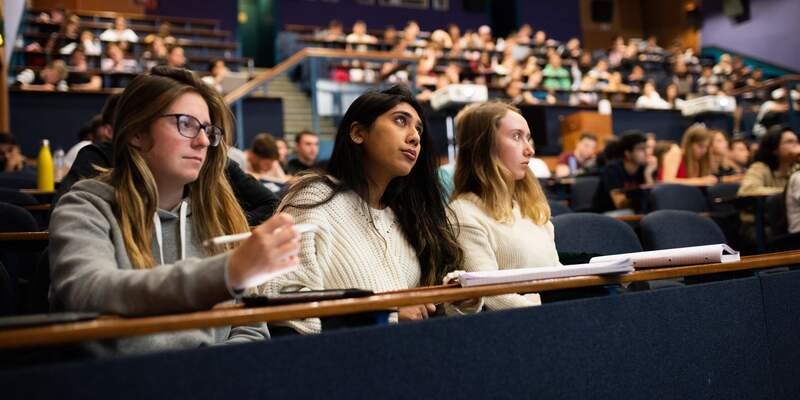View semester dates

BSc (Hons) Economics and Econometrics
Develop the analytical skills to unlock value in economic data
Year of entry: 2026/27
View semester dates
Interested in finding out more about the national economy and the economic decisions made by organisations? Enjoy testing theories, identifying patterns and finding solutions?
Economies across the world are changing at a rapid rate. This course will teach you the methods used for analysing economic data and equip you with the mathematical and statistical skills to advise businesses on economic policies, predict patterns of behaviour and reduce the risks involved in financial decision making.

It's been a long journey, and I always emphasize that it started at York, where I learned so much of the economics I've used throughout my career.
Professor Daron Acemoğlu (BA Economics, 1989; Nobel Prize for Economic Sciences, 2024)
Course content
By combining the study of economics with the mathematical and statistically focused area of econometrics, you will learn about current issues in modern-day economic forecasting and analysis while developing the analytical, problem-solving and quantitative skills to understand and interpret economic indicators.
The first year of our economics courses introduce the key areas that underpin the rest of the course. Years 2 and 3 consolidate and expand upon this knowledge via a series of core and option study modules which have been developed to give you a thorough understanding of the subject and enable you to tailor the degree to fit your academic and career interests.
Year 1
The first year provides a broad introduction to all areas of economics, from small scale economic decisions at an individual and local level through to issues that impact upon national and international economies.
Core modules
- Principles of Economics
- Mathematics for Economists
- Foundations of Economic History
- Data, Evidence and Policy
- Probability and Statistics
You will also study one option module. In previous years, options have covered topics such as:
- Introduction to Finance
- Open/Elective modules
Elective modules
You may be able to replace one option module with an elective module, studying a complementary subject, a language or an interdisciplinary topic.
Academic integrity module
In addition to the above you will also need to complete our online Academic Integrity module.
Year 2
The second year will advance your analytical skills and techniques.
Core modules
Option modules
You will also study two option modules. In previous years, options have covered topics such as:
Year 3
In third year you will dig deeper in core economic topics and explore areas of your interest in greater detail allowing you to tailor the course to your future career path.
Core modules
Option modules
You will also study three option modules. In previous years, options have covered topics such as:
- Bubbles, Panics and Crashes
- Commodities Markets and Derivative Securities
- Economics of Social Policy
- Experimental and Behavioural Economics
- Financial and Time-Series Econometrics
- Game Theory
- Health Economics
- Information and Institution Design
- International Economic Growth and Development
- International Economics
- Labour Economics
- Macroeconomics: Topics in Theory for Policy
- Monetary Economics
- Political Economics
- Structure and Regulation of Financial Markets
- Economics Dissertation
Our modules may change to reflect the latest academic thinking and expertise of our staff, and in line with Department/School academic planning.
Learning outcomes
Every course at York has been designed to provide clear and ambitious learning outcomes. These learning outcomes give you an understanding of what you will be able to do at the end of the course. We develop each course by designing modules that grow your abilities towards the learning outcomes and help you to explain what you can offer to employers. Find out more about our approach to teaching and learning.
Learning outcomes for this course
- Identify issues and situations in society where economic concepts and principles can provide insight, and confidently apply those concepts and principles as appropriate.
- Apply flexibly the methods of logical and mathematical reasoning used by economists and econometricians, including within formal models, with an understanding of the purpose and scope of such models.
- Independently locate, compile and present social, economic and financial data, with an understanding of the strengths and weaknesses of such data.
- Use proficiently statistical, econometric and computer-based techniques for analysing data, including in applying and testing models or in economic and financial forecasting.
- Engage with, and draw on, academic and professional research in economics and econometrics, with an ability to distinguish different themes within it, and to synthesise ideas from it.
- Recognise contemporary and historical economic episodes and phenomena, and confidently analyse their causes and significance
- Analyse and critically evaluate economic and financial policies, of government and/or other institutions.
- Clearly present, explain and communicate their analysis, drawing on PLOs 1-7, in a variety of modes including verbal/written and technical.

In the Economics Department, there is great support from the lecturers. Plus, there are opportunities to meet many people and amazing events that create lots of opportunities for you in the future. I have really enjoyed my time at York!
Fees and funding
The fees and funding information here is for students starting in the 2026/27 academic year.
If you take a year abroad or year in industry you'll pay a reduced rate of fees for that year.
Annual tuition fees
| UK (home) | International and EU |
|---|---|
| £9,535 (TBC) | £27,500 |
The UK government has announced its intention to increase tuition fees from £9,535 to £9,790 for the 2026/27 academic year. We expect this to apply to new UK (home) undergraduate students starting their studies in September 2026.
UK (home) or international fees?
The level of fee that you will be asked to pay depends on whether you're classed as a UK (home) or international student. Check your fee status.
Fees for subsequent years
- UK (home) fees may increase within the government fee cap in subsequent academic years. We will notify you of any increase as soon as we can.
- International fees are subject to increase in subsequent years in line with the prevailing Consumer Price Index (CPI) inflation rate (up to a maximum of 10%).
More information
For more information about tuition fees, any reduced fees for study abroad and work placement years, scholarships, tuition fee loans, maintenance loans and living costs see undergraduate fees and funding.
Funding
We'll confirm more funding opportunities for students joining us in 2026/27 throughout the year.
- UK government loans
- UK scholarships and bursaries
- International scholarships
- Country-specific funding
- US loans
Nigel Thompson Memorial Scholarships
These scholarships are worth £3,000 each year to talented students from families of lower income.
York, Oxford, Cambridge, Imperial
Just four UK universities are rated Gold for teaching and top ten for research* in the latest national assessment exercises.
* Awarded joint 10th in the Times Higher Education ranking of the Research Excellence Framework 2021.
Teaching and assessment
You’ll study and learn with academics who are active researchers, experts in their field and have a passion for their subjects. Our approach to teaching will provide you with the knowledge, opportunities, and support you need to grow and succeed in a global workplace. Find out more about our approach to teaching and learning.
Teaching format
All teaching takes place within a large and active department, led by a specialist team of research-active teaching staff. Modules are taught via a series of lectures supported by discussion group seminars and practical classes. We place a strong focus on applying academic theory to real-life situations so, wherever possible, we find ways to incorporate practical work into our teaching to improve planning, teamwork and research skills.
Our academics have links with industry and are knowledgeable about emerging developments in the sector, so you can be sure you’re gaining a well-informed account of the issues and challenges facing the field of economics. In addition, each module has its own area on the virtual learning environment that provides easy access to supporting learning materials.
Timetabled activities
In your first year, you can expect:
| Lectures | 8-9 hours per week |
|---|---|
| Seminars | 1-2 hours per week |
| Workshops | 0-2 hours per week |
| Practicals | 0-2 hours per week |
These figures are representative of a typical week. Your contact hours will vary throughout the year due to your module choices, non-compulsory classes, exam periods and changes to scheduled activities.
Outside your timetabled hours, you'll study independently. This may include preparation for classes, follow-up work, wider reading, practice completion of assessment tasks, or revision.
In the UK, full-time students are expected to spend 1,200 hours a year learning. That's about 40 hours of classes and independent study each week during semesters. Everyone learns at a different rate, so the number of hours you spend on independent study will be different to other students on your course.
Teaching location
You will be based in the Department of Economics and Related Studies on Campus West. Your teaching will take place in a variety of locations on Campus West.
About our campus
Our beautiful green campus offers a student-friendly setting in which to live and study, within easy reach of the action in the city centre. It's easy to get around - everything is within walking or pedalling distance, or you can use the fast and frequent bus service. Take a campus tour.
Assessment and feedback
Assessment varies from module to module and includes a combination of exams, written essays and project work.
Your tutors will give feedback in a variety of forms depending on the specific needs of the module. This may consist of written feedback, in-class discussion, model answers, one-to-one discussions or online responses.
Careers and skills
This flexible course has been developed to provide you with the business skills to specialise in economic forecasting and statistical analysis as well as branching out into the wider world of economics. So whether you’re looking for a career in banking, finance, research or management consultancy, career prospects for graduates are excellent.
Following graduation around a third of our students go on to postgraduate study. Many progress to an MSc here at York. The Department of Economics has one of the largest graduate schools in the country for training and research.
Career opportunities
In recent years graduates have gone on to work with:
- KPMG UK
- The World Food Programme
- Ernst and Young
- Goldman Sachs
- The European Parliament
- HM Treasury
Transferable skills
Economics students graduate with a wide range of transferable skills. As well as developing your subject-specific knowledge, an economics degree will equip you with:
- Logical thinking
- Quantitative skills
- Problem-solving
- Communication skills
Entry requirements
| Qualification | Typical offer |
|---|---|
| A levels | AAB including Mathematics |
| Access to Higher Education Diploma | 36 credits at Distinction and 9 at Merit or higher plus Level 3 units in Mathematics or in conjunction with an alternative Level 3 Mathematics qualification |
| BTEC National Extended Diploma | DDD including Mathematics or in conjunction with an acceptable alternative Level 3 Mathematics qualification |
| European Baccalaureate | 80% overall including Mathematics |
| International Baccalaureate | 35 points with a minimum grade of 5 points in Higher level or 7 in Standard Level Mathematics (either Analysis and Approaches or Applications and Interpretations). |
| T levels | We are currently not accepting T Levels for this course unless an additional A Level (or equivalent qualification) in Mathematics has been taken. |
| Scottish Highers / Advanced Highers | Advanced Highers - B in Mathematics plus Scottish Highers - BBBB We may also be able to consider three Advanced Highers or a combination of Highers and Advanced Highers, where an applicant does not meet the grade requirement through Highers alone. Please contact us to discuss your qualifications. |
| International foundation programme | Foundation Certificate from our International Pathway College or an appropriate alternative. |
| Other international qualifications | Equivalent qualifications from your country |
Alternative offers
Meeting the following additional criteria may qualify you for an alternative offer.
| Criteria | Adjustment |
|---|---|
| Widening participation | BBC including B in Mathematics This is conditional upon successful completion of the WP programme including the YorJourney module (Black Access Programme, Next Step York) or successful completion of Realising Opportunities More about widening participation. |
| Contextual offer | BBB including Mathematics |
| EPQ | If you achieve A or higher in the EPQ, you may be eligible for an alternative offer up to one A level grade (or equivalent) below our typical offer. |
English language
If English isn't your first language you may need to provide evidence of your English language ability. We accept the following qualifications:
| Qualification | Minimum requirement |
|---|---|
| IELTS (Academic) | 6.5, with a minimum of 6.0 in each component |
| IB English | A score of 4 in English A or 5 in English B (Higher Level or Standard Level) |
| Cambridge CEFR | 176, with a minimum of 169 in each component |
| Oxford ELLT | 7, with a minimum of 6 in each component |
| Oxford Test of English Advanced | 136, with a minimum of 126 in each component |
| Duolingo | Integrated subscores: 120 overall, with a minimum of 105 in each component |
| GCSE/IGCSE/O level English Language (as a first or second language) | Grade C / Grade 4 |
| LanguageCert SELT | B2 with a minimum score of 33/50 in each component |
| LanguageCert Academic | B2 with a minimum score of 33/50 in each component |
| Kaplan Test of English Language | 478 Main Flight score with 444 in each component |
| Skills for English | B2: Merit overall, with Pass with Merit in each component |
| PTE Academic | 61, with a minimum of 55 in each component |
| TOEFL | 87 overall, with a minimum of 21 in each component (taken before January 2026) 4.5 with 5 in Listening and 4.5 in each other component (taken after January 2026) |
| Trinity ISE III | Merit in all components |
| Other English language qualifications | We also accept other English Language qualifications, including various school-leaving certificates. |
For more information see our undergraduate English language requirements.
If you haven't met our English language requirements
You may be eligible for one of our pre-sessional English language courses. These courses will provide you with the level of English needed to meet the conditions of your offer.
The length of course you need to take depends on your current English language test scores and how much you need to improve to reach our English language requirements.
After you've accepted your offer to study at York, we'll confirm which pre-sessional course you should apply to via You@York.
Next steps
Discover York








